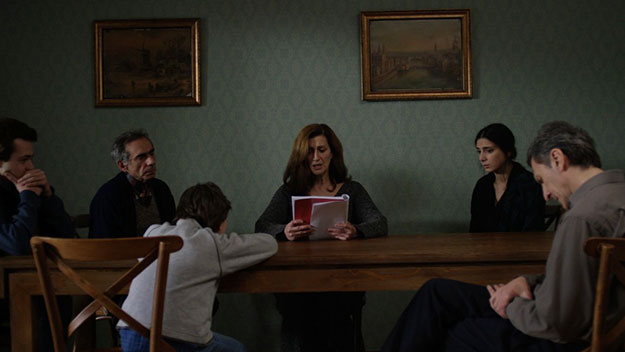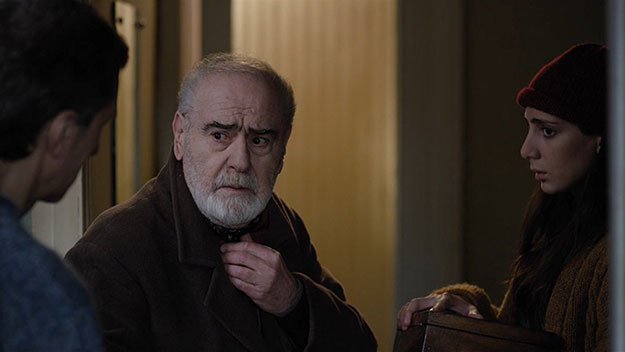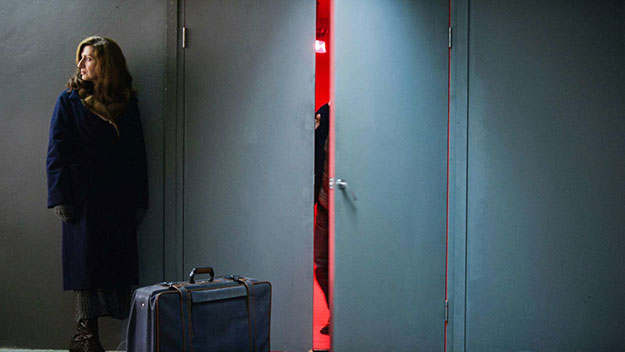ND/NF Interview: Ana Urushadze
Ana Urushadze’s Scary Mother is the story of one woman’s flight from fixed family roles and her psychosexual unraveling as a second self bursts through storytelling. Shot against an isolating cityscape and suffused with milky greys, pallid blues, and the occasional red, Urushadze’s debut stars Georgian actress Nata Murvanidze as Manana, the inspired, besieged writer and mother, whose biggest supporter is an obsessive stationery store owner named Nukri.
Urushadze hails from the Georgian film community and spoke fondly of the collaborative ethos she experienced on movie sets with her father, Zaza, director of Academy Award nominee Tangerines. Though only Urushadze’s first feature, Scary Mother was itself chosen as her country’s submission for the foreign-language Oscar, and has earned awards on the international film circuit since its world premiere last fall in Locarno.
With the film’s selection for New Directors / New Films, Urushadze was brought to New York for the first time, leaving her feeling a bit like a spectral visitor: “At one moment everything is perfect and amazing, and in another moment everything is apathetic and empty. It is this mixture of totally different heaven and hell.” Film Comment sat down with her during her visit to speak about the themes of mother monsters, social abjection, and regret.

What moved you to depict the sorts of domestic relationships that you explore in the film? I am thinking of the writer’s husband and how he becomes quite unlikable by the end.
Actually, I didn’t want [the relationship] to be in one category. So I tried to balance a little bit from the beginning: he offers her space, but still he is very controlling and doesn’t really understand that he is. He washes her legs, but, of course, overall, he burns her book. With Manana I was really interested in this one person being outside of the daily life of a group. The group happened to be a family, and one person out of the group happened to be a mother. It’s about having a family and not having time and opportunities for yourself or doing the things you love apart from family. Of course you love your family, and you love donating your time to them, it’s natural. In this particular woman’s story, it is like she lost her family—everything seems to be going well, but she just needs to write at this point of time. Why she didn’t write before, we don’t know. But it happened that she didn’t, and I’m kind of fatalist. She’s having this now-or-never moment. And she just starts to write in her own way of writing and her own style. She has this particular style for many reasons, maybe. But she does have it.
Before we started, you were saying that you like writers from an earlier era. Manana’s style is this pornographic fantastical form. What made you want to depict her as a writer in that way specifically?
One initial idea for the text and the way she perceived the world was that I wanted it to have some kind of weird effect on the family members. When she read the text, I wanted the reactions to be negative. The text needs to be about them and written in a strange, creepy way. So I had this idea in mind of what the text should be like. My sister wrote it. I left the text blank, and then I continued writing the script. Because I’m not a writer, I first asked another Georgian author to write it. He did, it was very good, written in a perfect way—but it wasn’t her version. It didn’t feel like her character to me or how she perceived the world. Then I asked my sister. She was like, “No, I don’t think so,” at the beginning, but then she said okay. What she did was give me exactly the form of how Manana perceives the world. It was great.
Could you speak a little bit about the theme of agency in the film?
It is this problem of women not having enough time for themselves, the things they love, and their jobs. You only have 24 hours a day. It’s this common issue of women who start a family early, then regretting it. Of course, this doesn’t apply to everyone. I know families where the women who start families very early are happy doing their own thing and raising children. It’s about choices, complaints, regrets—we have many.
Initially, the idea was about a man leaving the family. But when I start writing, I like to perceive other angles too. So I said, what if a woman leaves the family? And it somehow naturally becomes, in this particular script’s case, more interesting. I don’t like to say it in general that everything that you switch for a woman becomes interesting. But this particular plot did.
What were your intentions with the character of Nukri and his relationship with Manana?
It’s the kind of script where you really follow the character. I was thinking of where she would move when she leaves the house. Somehow, I stuck to this conversation about a stationery shop nearby. The script demanded someone who would be on her side. It happened naturally—it would be a shop owner, believing in her work, believing in her writing. But the moment he took it in himself, in his own skin… He gets obsessive, and he goes against his own morals in some ways, because it gets personal to him. He can’t really differentiate because he thinks it’s about service but then it’s also about him. And he doesn’t really know what to do with his emotions. He gets stuck between him and himself.

And that scene where she touches Nukri, what is happening for her in that moment?
When I talk about her style, it’s her style to touch things, to experience things while she’s writing. That’s why she needs this. She needs this kind of writing.
What inspired you to choose the Filipino mythology of the Manananggal [a vampire-like creature] for use in the storyline? Where did you find her?
It was very random. I was googling mythologies and I was interested in mythology images. My aunt actually was a mythology teacher. Since childhood, she would give us classes on mythology, and I got very interested. I just randomly searched a list of pictures and I saw Manananggal and thought, “What is it?” And when I read the description, it was the exact metaphor of the life Manana was going through, her life events. It was crazy. It fit for me very well. I thought, what if she dreams that she is that creature and she gave its description.
There’s a recurring sound in the movie, a staticky clicking. Could you speak a little bit about the sound artist you worked with, Nika Pasuri?
He’s my friend, he is a very talented young Georgian composer who lives in Amsterdam now and works there. Our lead actress, Nata Murvanidze, recommended him to me because she knows him, and he worked at her theater. So I contacted him and sent him the script, and then sent him a YouTube video where there were little, brown bat sounds. “Little, brown bat sounds,” it’s called actually. I’ll show you. [plays the YouTube video on her phone] First thing I did was send this. He caught the feeling and emotions and the mood. Then he worked on it, and we agreed that it should be high-pitched and a little bit irritating. It somehow depicted the stages and theme of the protagonist. And he just did everything else by himself.
The color red is another effective motif in the film’s feel—was that an early choice?
Yes, that was in the script. The red theme was there—the mother has red hair, because she is so affected by her head, and it’s very cliché: the color of death, blood, and in this case, mother.
Could you talk about Manana’s relationship with her father and the final scene between them?
Her father is a teacher. So in the final scene, what I wanted was for him to analyze her life. When he realizes it’s his daughter [writing the text he has been translating], he goes against his own vision and becomes unhappy. He speaks from the point of view of the teacher and then he speaks from the point of view of the father.

How are we supposed to feel about Manana in the end? Her writing is perhaps a bit exploitative with regard to her family.
She says that it is not about her family. But of course, you can’t really say that. She took these impressions, these details, from her family life. Maybe she doesn’t even know that, she did it subconsciously, and she said didn’t. Because she loves her family. That’s why they are insulted: “Okay, it’s not your point of view but, you know, you wrote it and not anyone else. You have a family, and it’s us.”
You and your father have both cast Nata Murvanidze. Do you ever work together?
My father is a director and I used to attend his shoots, and he would cast her. I’ve known her for years. I was 15 when I first saw her, and I knew her before from the theater and movies. She is a very well-known actress in Georgia. To me, she is one of the most talented actresses I know, and a very, very dear friend. She is amazing. She not only recommended composers but actors as well.
What do you think comes next?
I am working. I want to shoot so much, I’m dying. Now I am trying to write a script, jotting down ideas all day. It moves forward, but I am quite slow about it. I already told a bit of the story to my sister, and I have no one closer than her. I don’t really separate us two. The thing is, the moment I told her, my motivation dropped, when I said it out loud. I want her so much to know about the story, that now she knows all I got. I felt like, “Oh my god, now what?” So I don’t really talk about it. I try not to take it too seriously. It has this detective sort of feel…
Read more about Scary Mother in the “Release Me” column in the May/June 2018 issue.
Leah Simon is a graduate of NYU Cinema Studies and will be working on her thesis as a media studies scholar with U.C. Berkeley’s Folklore Program.







